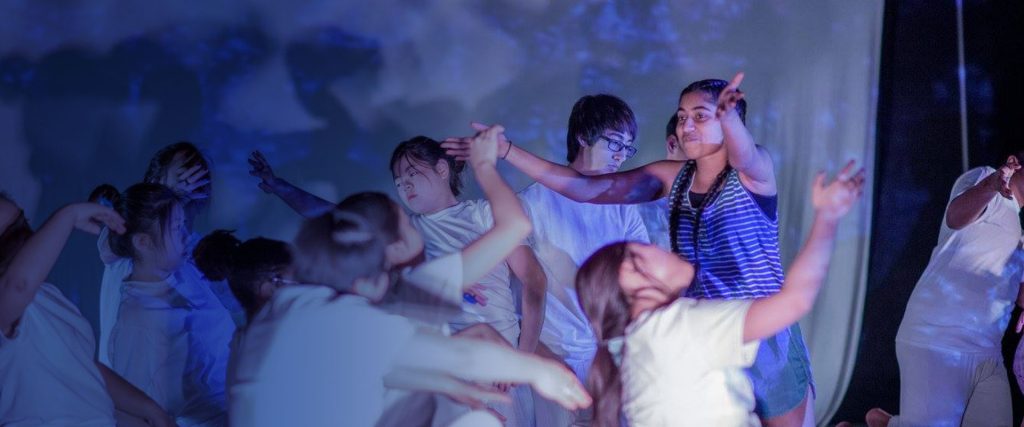“How to Duck and Weave and Bend Like the Willows”: DramaFest at the Thousand Islands Playhouse

A nearly 80-year feat—it’s the National Theatre School DramaFest. The long-standing festival brings high schools together from across their province in British Columbia, Alberta, and Ontario, while out East, the four Atlantic provinces participate together. In Ontario’s DramaFest, District Festivals kick off the three tiers of showcases. Schools first perform their productions in their respective district where they may then be invited to a Regional Showcase. Two productions from each of the six Regional Showcases are invited to the Provincial Showcase. This year, beginning tomorrow, the Thousand Islands Playhouse is tackling the role of Host in the final showcase.
In anticipation of this exciting event making its way to Gananoque, I sat down with Festival Coordinators Natalie Simard and Mathew Easey, both of whom are teachers that have worked on student productions in DramaFest over the years. I was also lucky enough to have three students involved in the festival join us: Preesha Kalluparampil Prasad, Catharine Boitor, and Toby Ramondino. The three are members of the Youth Advisory Committee (YAC), a brand-new initiative of DramaFest. This year’s YAC brings together participating youth from across Ontario to discuss ways to better the festival.
This interview has been edited for length and clarity.
We settled into the Zoom meeting as folks joined from Welland all the way to Ottawa and other cities in between. Excited by the connection we were able to elicit despite the distances, I was curious to hear more about the connectivity involved in the YAC. “It’s been really awesome to meet with other students who have been involved and talk through things to make [DramaFest] better, things to improve,” said Boitor. “But also things that we love about it. It’s a bunch of theatre nerds in a room basically, well, a Zoom room. I look forward to every time we meet, just to talk about new things, especially after all the District and Regional festivals that we’ve had the past month and a half. We’ve been able to talk a lot more about things that we liked, that were new things, that we didn’t like. And everybody’s just so wonderful.”
Prasad added to Boitor’s thoughts. “It’s really interesting seeing the way our experiences in the drama festival differ, because obviously not every school has the same—what’s the word—we don’t all have the same sort of facilities and access to things, and we don’t all perform the same way or have the same structure, and it’s just really interesting hearing all these different perspectives on what a play making process is like.”
With these differing perspectives in the same room, the important topics brought forward have conversations culminating in wonderful ways. “We also have meetings on how we can reach out to more communities,” Ramondino said. “We had a meeting based off of our newsletter, and how we can make that accessible and easy for everyone to access, so that everyone knows what’s going on within Dramafest as well.”
Boitor brought up their discussion about inclusivity practices. “We talked a lot about people in the audience who have disabilities. So people who are hard of hearing—we were talking about different ways to maybe have them have a script. And we talked a lot about how a lot more professional theatres do subtitles… We also talked about inclusivity on the stage. So inclusivity in the scripts, how to give people—how to help people feel empowered, to try exploring different themes and stories.”

In addition to the agency the YAC provides the students, DramaFest itself highlights student-actioned work, such as Boitor’s original play being performed and Prasad’s directing of their school’s production. “As [DramaFest] progresses, there’s more and more student-written plays,” said Ramondino. “It’s a lot more based off of students having voices and really showing that skill and putting it to use.”
Prasad spoke to the kind of content she feels students have put forward. “Throughout the years, I’ve seen that the plays shown kind of reflect the world, in a way. This year, I saw a lot more political plays about gender and violence and things like that. But I also saw a lot of satires this year. I think I saw one about—it was kind of like The Lorax in the sense that it was about this apocalyptic world where there was only one tree left.”
As described by Easey, there are immense benefits to highlighting student-created theatre. “When students have an opportunity, as in a class, to build from the ground all the way up to a polished show, it’s the most engaged you can have students in your class be… On top of that, one of the things that I think is so valuable even, because a lot of these students are not necessarily going to pursue theatre as a career, or television or whatever, but one of the best things that the festival gives them, in my opinion, aside from teamwork and responsibility and all of those things that come into creating a show—it’s the ability to take feedback graciously.”
Prasad continued to speak about these transferable life skills gained through DramaFest. “I started drama in grade nine, and back then it was basically all grade nines. There [were] maybe two grade twelves in there. And I—as we continued to move on and grow up—I noticed a lot that each of us were really coming out of our shells and becoming more confident in who we were, because I was having a conversation with one of my friends the other day who’s also in drama club, and they were saying how drama club kind of gave them a place where they could feel unashamedly themselves.”
Bringing up their personal growth throughout their years participating, Ramondino said, “I think it really helps with confidence and really getting your opinion out there to get to go and do something so impactful… When I first joined, I was a shy grade nine. I didn’t know anyone. It was all—my school’s club was all filled with just grade elevens and twelves, but through DramaFest, I was able to grab a—get a voice—and now I’m encouraging younger students to join the club.”
As a teacher facilitating many DramaFest productions, Simard has and continues to see the impact of the festival. “There are several students who are in charge of things, and we give over the reins of trust, and they have learned how to figure out things and anticipate things, even things that we’re [as teachers] like, ‘Oh yeah, we should have had that ready.’ And I think on that end, the theatre festival crews, specifically, get a lot of skill on how to deal with something that’s burning, right. That there’s a disaster and you have to fix it. Or how to duck and weave and bend like the willows, because theatre, you can’t just—you have to learn how to adapt, and I think that’s really, really good for kids, is learning to adapt and that’ll help them for the rest of their lives.”

Or the relationships one makes through DramaFest could be what stays with students long-term. Boitor said: “I’ve made so many connections with people and made so many new friends… And I think that’s just one of the most wonderful things about it, is because it just connects us from all different places.”
Sharing a story about lasting impacts, Easey jumped in. “It was this group of kids I thought would never have a chance to move on if we, if we actually [got] a chance to move on, because financially, it was just, was so tough for them. And we kept moving on, and we kept finding money, and they kept fundraising and finding new and interesting takes on the script that they had chosen. And we got to Provincials, and I got them all calmed down and quiet. We were the last show. We were closing the festival. We were at the Hart House, and I came into the house and I sat down and I watched them, and the show was just so perfect. They had taken it so far from when they performed at Districts. And I just cried. I just cried in the audience, because I was so happy for them. And those kids still email me. They’ve been out of high school for two, three years now, and they still email me. It was transformative for so many of them. That’s the most beautiful experience I’ve had, and I still cry talking about it,” said Easy, finishing his story in tears.
Simard also understands DramaFest’s ability to empower students. “I think a lot of the time, theatre is secondary to sports and academics and things like that, and it’s not as ‘important’,” she said with air quotes. “This is the first time for a lot of students that they—like it is important. Your voice is important. You’re good at what you’re doing, or it’s okay to have fun, or you can be silly and weird and nobody is going to be mean to you about it. Just seeing kids realize that there’s a space for them and there’s—that we celebrate them.”
It’s a magical feeling to be celebrated, as Simard said, for doing what you love. Theatre can be life-changing for people and hearing what young folks had to say about their experiences reminded me why I got involved in theatre in the first place. DramaFest is vital—it provides a uniquely incredible experience for young folks, and I hope it only continues to grow.
The Ontario National Theatre School DramaFest begins its Provincial Showcase tomorrow, May 7, 2025 and runs until May 10, 2025 at the Thousand Islands Playhouse. More information can be found here. Check out DramaFest’s Instagram here.
